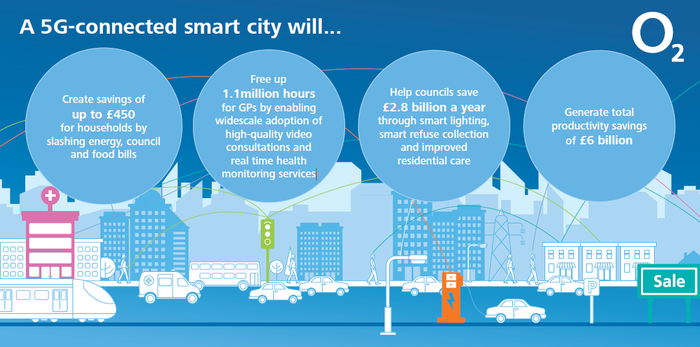O2 UK has released some new research, but the underlying message seems to be about begging more help from local and central government, enterprise and industry to help with the rollout of 5G.
March 14, 2018

O2 UK has released some new research, but the underlying message seems to be about begging more help from local and central government, enterprise and industry to help with the rollout of 5G.
It does seem to be a bit of a PR exercise. For years the telcos have been saying they need help in deploying the incredibly expensive 5G networks, but little seems to be coming back. Perhaps this is a more tactile approach; show the benefits and remind the stakeholders that none of this can be achieved without assistance and collaboration. It’s a theoretical shop window for all those who will profit from the vast expense laid out by the operators.
Some might argue that while there are benefits for the wider community, the telcos will ultimately profit from each usecase. There are few industries or companies which ask for a deposit beforehand which is what the telcos seem to be asking. Your correspondent appreciates the food he buys from the supermarket, but he is not asked by the famers for a contributions to make sure the crops grow tall or the livestock big enough.
On the other side of the argument, the telcos are being asked to be the foundation of the digital economy with so many internet-based companies and services profiting off the network which they haven’t contributed to. These organizations are getting to the connected bonanza first, getting the best choice of the profits, before letting the rest fall through the cracks to reach the telcos at the bottom of the totem pole. Telcos support the digital economy and all those who are living off it are effectively stealing profits the telcos used to call their own. Perhaps there should be more support.
It should also be worth noting that the money side of things isn’t the only way telcos can be supported. What has also been lacking is the access to critical infrastructure (such as street furniture) to ensure 5G can be embedded into our society. From O2’s perspective, 5G needs to be a common goal not just one which society is reliant on the telcos for. This is sound argument, and evidence of this is in the Department of Digital, Culture, Sport and Media.
You have to wonder how plans to make the UK a digital powerhouse can sit in the same pile and as an application for England to be the next host of the Badminton World Cup. While this is a slightly obnoxious way for us to describe the set up, it does demonstrate a point; if the digital future of the UK is so important to the government, why is it being coupled with areas which have (at best) loose connections.
The infographic below out lines some of the saving individuals, businesses and public services might be able to experience:

In the household, O2 believes £145 could be saved by the introduction of smart grids, council tax could be £66 less if smart refuse collection is introduced, smart fridges could reduce food waste by £236 a year and there will be savings to be made by the introduction of electric, 5G-enabled vehicles.
Looking at the local councils, 5G telehealth and monitoring could save up to £890 million in social care, smart refuse collection would trim £1.8 billion annually and energy savings of £91 million could be achieved through the introduction of smart LED street lighting.
The key message here seems to be don’t leave the burden of responsibility solely on our shoulders.
“There are more mobile connections in Britain than there are people and the demand for mobile frequency and easier access is only increasing,” said Derek McManus, O2’s Chief Operating Officer.
“It’s clear from our report that 5G technology will play a vital role in ensuring that all citizens get the mobile service they deserve. But while 5G promises a range of unprecedented benefits, we should be clear that these won’t be achieved without collective investment and collaboration. That means complete alignment from operators, public service providers, local authorities, landlords and technology companies to explore new opportunities for better connectivity and denser coverage.”
O2’s report and apparent complaints over a lack of collaboration in the space, does seem to have come at an appropriate time. Over the last couple of days there have been a couple of announcements from the UK government which seem to be little more than banner waving. On Monday, the government seemed to be in a very self-congratulatory mood after it announced six projects which would share £25 million to explore 5G.
Those who are in charge of the projects will certainly be happy with the investment, though £25 million is simply a scratch on the surface of the £1 billion which was promised a year ago to accelerate 5G developments. This number is starting to look like chest-pounding exercise from the government and little else. If the UK government is realistic about keeping the country at the top table, it needs to start spending the money it is promising.
£25 million is not pocket change but you have to wonder how far a six-way split will get these projects in achieving something genuinely ground-breaking in the 5G world. Government saviour claims when the reality is short-change is only one of the issues here though. What about future-proofing regulations, or making sure the national education curriculum is preparing students for the digital economy? O2 might be right, no-where near enough is being done.
About the Author(s)
You May Also Like








.png?width=300&auto=webp&quality=80&disable=upscale)


_1.jpg?width=300&auto=webp&quality=80&disable=upscale)


.png?width=800&auto=webp&quality=80&disable=upscale)